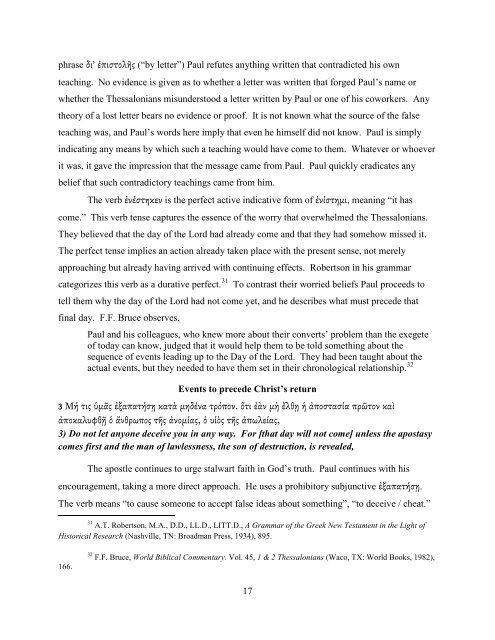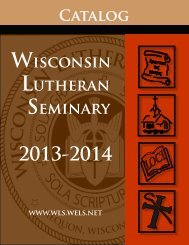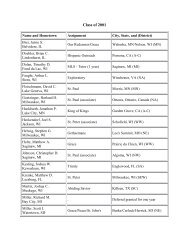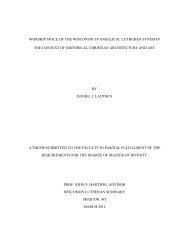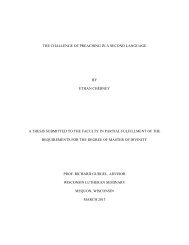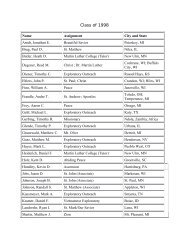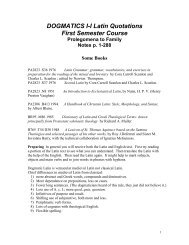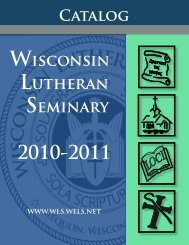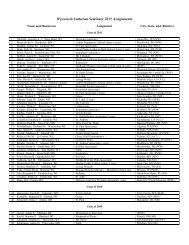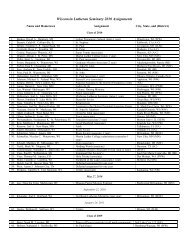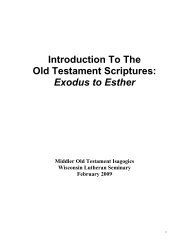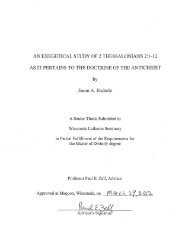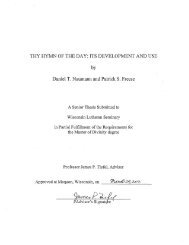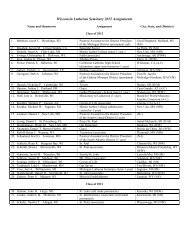Untitled - Wisconsin Lutheran Seminary - WELS
Untitled - Wisconsin Lutheran Seminary - WELS
Untitled - Wisconsin Lutheran Seminary - WELS
Create successful ePaper yourself
Turn your PDF publications into a flip-book with our unique Google optimized e-Paper software.
phrase διʼ ἐπιστολῆς (“by letter”) Paul refutes anything written that contradicted his own<br />
teaching. No evidence is given as to whether a letter was written that forged Paul’s name or<br />
whether the Thessalonians misunderstood a letter written by Paul or one of his coworkers. Any<br />
theory of a lost letter bears no evidence or proof. It is not known what the source of the false<br />
teaching was, and Paul’s words here imply that even he himself did not know. Paul is simply<br />
indicating any means by which such a teaching would have come to them. Whatever or whoever<br />
it was, it gave the impression that the message came from Paul. Paul quickly eradicates any<br />
belief that such contradictory teachings came from him.<br />
The verb ἐνέστηκεν is the perfect active indicative form of ἐνίστημι, meaning “it has<br />
come.” This verb tense captures the essence of the worry that overwhelmed the Thessalonians.<br />
They believed that the day of the Lord had already come and that they had somehow missed it.<br />
The perfect tense implies an action already taken place with the present sense, not merely<br />
approaching but already having arrived with continuing effects. Robertson in his grammar<br />
categorizes this verb as a durative perfect. 31 To contrast their worried beliefs Paul proceeds to<br />
tell them why the day of the Lord had not come yet, and he describes what must precede that<br />
final day. F.F. Bruce observes,<br />
Paul and his colleagues, who knew more about their converts’ problem than the exegete<br />
of today can know, judged that it would help them to be told something about the<br />
sequence of events leading up to the Day of the Lord. They had been taught about the<br />
32<br />
actual events, but they needed to have them set in their chronological relationship.<br />
Events to precede Christ’s return<br />
3 Μή τις ὑμᾶς ἐξαπατήσῃ κατὰ μηδένα τρόπον. ὅτι ἐὰν μὴ ἔλθῃ ἡ ἀποστασία πρῶτον καὶ<br />
ἀποκαλυφθῇ ὁ ἄνθρωπος τῆς ἀνομίας, ὁ υἱὸς τῆς ἀπωλείας,<br />
3) Do not let anyone deceive you in any way. For [that day will not come] unless the apostasy<br />
comes first and the man of lawlessness, the son of destruction, is revealed,<br />
The apostle continues to urge stalwart faith in God’s truth. Paul continues with his<br />
encouragement, taking a more direct approach. He uses a prohibitory subjunctive ἐξαπατήσῃ.<br />
The verb means “to cause someone to accept false ideas about something”, “to deceive / cheat.”<br />
31 A.T. Robertson, M.A., D.D., LL.D., LITT.D., A Grammar of the Greek New Testament in the Light of<br />
Historical Research (Nashville, TN: Broadman Press, 1934), 895.<br />
166.<br />
32 F.F. Bruce, World Biblical Commentary. Vol. 45, 1 & 2 Thessalonians (Waco, TX: World Books, 1982),<br />
17


